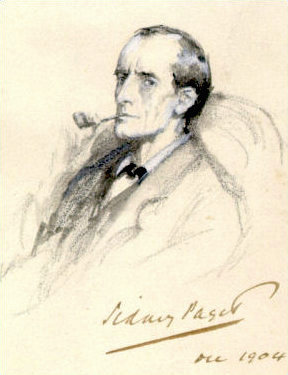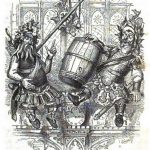
Source: Wikipedia.
Found in the private papers of Dr. John Watson, London (1855-1930), under the heading “Sherlock Holmes & The Unsolvable Case”:
Even a detective with the sagacity of my friend Sherlock Holmes must, on occasion, decline a request, but this particular instance was so extraordinary that I feel compelled to put it to paper. At the time we happened to be at our Baker Street residence, I feeling the need to see my old friend in spite of the complete marital bliss which I’d enjoyed for some time. Holmes was in a restive mood this evening and kept returning to the spirit case and gasogene he kept in the corner but libations, his cigars, cocaine, laudanum, opium, ether, mescaline, isoamyl nitrite, tincture of cannabis, a bottle of pills containing acetylsalicylic acid, as well as a handful of betel nuts that had been the gift of a client who’d returned from the Far East, held little interest for him. Turning from these dalliances he would then march across the room, arms crossed, head on his chest, his usual manner when considering a problem. But at this time, of course, the problem was the absence of a problem, one which even Holmes, with all his perspicacity, could not resolve.
I was on the point of taking my leave when Mrs. Hudson showed in a young urchin bearing a note. Holmes immediately stepped forward and took it, his dark eyes darting over the paper. Then, with no hesitation, even with an apparent lack of awareness of the rest of us in the room, he dashed down the stairs. I gave our young Hermes a penny and offered a few words to placate Mrs. Hudson’s concerns about mud on the rug before I followed.
It was only once we were in a hansom cab racing towards London’s banking district that Holmes spoke.
“The note was from Inspector Lestrade, Watson,” he said in a voice that any other might have taken for calm and measured but which I recognized as positively ebullient. “There has been a robbery of a London bank and he needs my assistance.”
A simple robbery hardly seemed to demand the genius of Sherlock Holmes, but when the Inspector showed us the scene the reason became clear.
“The walls, which are completely undamaged, are over a foot thick, comprised of large stone bricks,” he said. “As you can see the door was bolted from the outside. There is no way in from above or below, and yet the thief was able to make off with a case containing ten thousand pounds’ worth of gold bullion.” Lestrade’s sallow rat face looked very grave in the flickering gaslight. “I don’t like to admit that this case is quite beyond any of us, Holmes,” he said quietly. Then, raising his voice, he added, “Also all twenty guards are still present and their whereabouts completely accounted for. None of them are suspects.”
Holmes cleared his throat. “Yes, Inspector, and I can also tell that you’ve been here yourself at least twenty-four hours.”
“I should think that would be obvious,” Lestrade replied, “since it’s been raining nonstop almost the whole day and my clothes are completely dry.”
Holmes raised his finger and seemed about to speak then abruptly turned to the room. He walked in a full circle, examined the walls closely, and looked at both the ceiling and floor.
“Well, Inspector, this is certainly a most curious case, and I wish you the best of luck with it.”
Lestrade sputtered. “Surely you’ll assist us!” But Holmes only shook his head.
“If only I could, Inspector. However I have promised my services to the Atkinson brothers in Trincomalee, and I must make immediate arrangements to leave. There are, of course, other private inspectors in London who I’m sure could help you with this case. Perhaps my brother Mycroft, or that fellow Entwistle.”
“Holmes,” said Lestrade in an almost inaudible growl. “Isn’t Entwistle that buffoon you said once put his lips to a violin and tried to play it as though it were a trumpet?”
“This is no time to discuss music, Inspector. Come, Watson, I’ll need your assistance in my travel arrangements.” With that he turned and stepped hurriedly from the room, and I followed, throwing a meager apology to the Inspector.
An hour later we were on the other side of London in a pub below street level dining on questionable oysters and a slightly less questionable dark Irish beer. It wasn’t until Holmes had filled his pipe that I spoke.
“Holmes, are you sure you shouldn’t have taken that case?”
He drew deeply and sent an azure cloud into the air above our heads.
“A man must know his limits, Watson. Never exceeding them is a true key to success.”
An epiphany struck me.
“This is rather like that case with the King of Bohemia, eh what?”
“Don’t test my limits, Watson.”






Sure would like to know the end of the story……(and not a moral, which I did get).
Somehow I thought that was the end of the story–although behind every story there’s another story.
I admit I’m new here… do you habitually write out Holmes mysteries? I never could grasp Sir Arthur. Tried twice.
But in short installments, maybe I will!
This is my first and probably last Sherlock Holmes mystery, unless I happen to think of a case Holmes really can solve. He is much better in small doses though, which is why “A Scandal In Bohemia” is one of favorite Holmes stories. It’s also one of the shortest.
Do you have limits? I haven’t noticed.
I may have some limits but I hold fast to the belief that our imaginations are limitless.
t’s awesome to pay a visit this web site and reading the views of all friends regarding this
josh recently posted…All you need to Know About The Remarkable Yahoo Groups – Yahoo Group